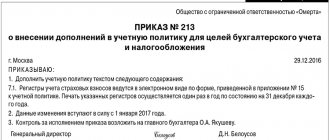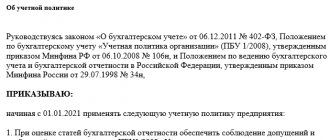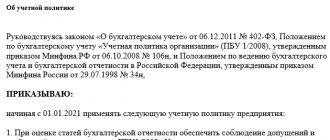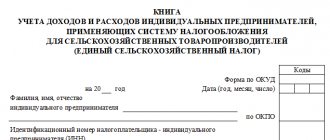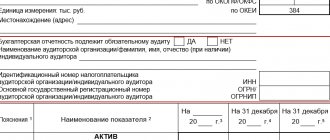Independence of accounting policies is relative
In paragraph 2 of Art. 8 of the Federal Law of December 6, 2011 No. 402-FZ “On Accounting” (hereinafter referred to as 402-FZ) determines that an economic entity independently forms its accounting policy, guided by the legislation of the Russian Federation on accounting, federal and industry standards. At the same time, in paragraph 14 of Art. 21 of Law No. 402-FZ establishes that the parent company has the right to develop and approve its own standards, mandatory for use by subsidiaries.
Therefore, clause 5.1 was added to clause 5 of PBU 1/2008 indicating that the organization chooses accounting methods regardless of the choice of accounting methods by other organizations. At the same time, the subsidiary forms its accounting policies based on the standards of the parent company.
Previously, there was no such provision in PBU 1/2008.
Changes to general provisions
According to clause 2, the provisions specified in Instruction No. 157n apply simultaneously with Standard No. 256n. It is indicated that the terms defined in the standards are used in Instruction No. 157n in the meaning in which they are used in these standards. Unless otherwise provided in the instructions for using the chart of accounts, the Ministry of Finance recommends following the standards.
When reflecting accounting objects, it is necessary to use the most conservative estimates - without overstating assets and (or) income and not underestimating liabilities and (or) expenses (principle of prudence) (clause 3 of Instruction No. 157n).
Clause 6 of Instruction No. 157n clarifies the list of accounting policy documents. Starting from 2021, the following must be approved:
- document flow rules;
- accounting information processing technology;
- document flow schedule;
- procedures for conducting inventories of assets, property recorded on off-balance sheet accounts, liabilities, and other accounting items.
According to paragraph 14 of Instruction No. 157n, as part of the formation of accounting policies, it is also necessary to approve the procedure for transferring accounting documents when changing the manager and (or) chief accountant or other official responsible for accounting.
Starting from 2021, document forms approved by the accounting entity must contain the mandatory details of the primary accounting document provided for by Standard No. 256n.
Clause 25 of Instruction No. 157n non-exchange transactions should be reflected at fair value (this is a general condition), in a conditional valuation of 1 object = 1 ruble (if data on the market price of similar or similar objects is not found), at book value and depreciation specified by the transferring party (if you received property from a public sector organization). Fair value must be determined using the market price method. The definition of non-exchange transactions is given in clause 7 of Standard No. 257n. The list of non-exchange transactions should be approved in the accounting policy. For example: “Receipt of escheated property”, “Free receipt of NFA from individuals”.
Clauses 32 and 383 of Instruction No. 157n define cases when objects transferred for use do not need to be taken into account according to Standard No. 258n. For example, such property may include the property of organizations responsible for organizational and technological support of other institutions. This applies if it transfers the property for free use to other institutions, but continues to incur the costs of its maintenance.
The procedure for assigning and applying inventory numbers is specified in paragraphs. 46, 47, 49. It is necessary in the accounting policy to develop a procedure for assigning an inventory number to inseparable improvements carried out in objects received under operating lease. Each fixed asset object included in a complex of fixed asset objects, recognized for accounting purposes as a single inventory object, should be assigned an internal serial inventory number of the complex of objects. It is formed as a combination of the inventory number of a complex of objects and the serial number of an object included in the complex.
Clauses 71, 151.1, 141, 144, 333 define the procedure for recording land plots and individual rights to them, including:
- on account 103 00 “Non-produced assets”, land plots used on the right of permanent (perpetual) use and plots involved by authorized bodies in economic circulation, the ownership of which is not demarcated, are subject to accounting
- on account 111 49 “Rights to use non-produced assets” - areas received for operating lease
- on account 108 55 “Non-produced assets that make up the treasury” – included in the treasury
- on off-balance sheet account 01 “Property received for use” - rights to limited use of other people’s land plots.
The algorithm for forming accounting policies has been clarified
PBU No. 1/2008–24/2011 are recognized as federal accounting standards (hereinafter referred to as FSBU). Such changes to 402-FZ were made by Federal Law No. 160-FZ of July 18, 2017, and they are in effect from July 19, 2017.
In paragraph 3 of Art. 8 of Law No. 402-FZ determines that when forming an accounting policy in relation to a specific accounting object, an organization makes a choice from a number of methods allowed by the FSB. In the updated PBU, the term “accounting provisions” is also replaced by the term “FSBU”, and in paragraph 24 of PBU 1/2008, the term “accounting statements” is replaced by the term “accounting (financial) statements”.
Clause 7 of PBU 1/2008 more clearly defines the rules by which a company must choose the method of accounting for a particular object. As before, you need to use the method established by the FBU. If the standards allow several alternative methods, the organization still has the right to choose one of them, taking into account the general requirements (clauses 5, 5.1 and 6 of PBU 1/2008).
If the FSB does not have a single method, in the general case you need to act according to the updated algorithm. Develop your own method, consistently applying first IFRS, then federal and industry standards on similar or related issues, and only then - recommendations in the field of accounting. In the previous edition, such a sequence was not fixed.
Kontur.Standard - reference and legal framework for accountants
Regulations on the organization's accounting policies for 2021:
- General provisions: working chart of accounts and analytical accounting, forms of primary documents, PBU 18/02, etc.
- Accounting policies for accounting and tax purposes
- Standard accounting policies of organizations based on OSNO, Simplified, lessor, leasing, construction companies, etc.
To start working in the Standard, simply register
To learn more
News
When adjusting the accounting policy for 2021, we believe that it will be necessary to make changes to the following sections.
Working chart of accounts. On January 1, 2021, 5 federal accounting standards for public sector organizations came into force. There are plans to introduce even more standards in 2021 and 2021. In this regard, the Ministry of Finance submitted for public discussion draft amendments to Instruction No. 157n. The amendments will affect not only the chart of accounts, but also the procedure for its application, for example:
- Federal standard 2Fixed assets2 provides for the allocation of a new group of fixed assets - “Investment real estate”, which will include real estate (part of it) received under a lease (property lease) and intended for subsequent sublease (sublease) or free use. We believe that accounting for objects in this group will be kept on a separate balance sheet account. Currently, property received by an institution under agreements for gratuitous or paid use (except for leasing) is subject to accounting in off-balance sheet account 01 “Property received for use”;
- The federal standard “Lease”, approved by Order of the Ministry of Finance of the Russian Federation dated December 31, 2016 No. 258n, establishes the reflection of property received under an operating lease agreement as part of non-financial assets (that is, on balance sheet accounts) as an independent object of accounting - the right to use the asset (now accounting leased property is maintained in off-balance sheet account 01).
Methods for assessing accounting items, as well as the procedure for disclosing information about them in accounting (financial) statements. In this section of the accounting policy for 2021 you can specify:
- procedure for assessing the fair value of an asset. Paragraph 55 of the Federal Standard “Conceptual Framework for Accounting and Reporting of Public Sector Organizations” establishes that when determining the fair value of an asset, the market price method or the amortized replacement cost method must be used. The accounting policy should reflect the procedure for applying these methods;
- the depreciation method used. The federal standard “Fixed Assets” introduces several methods for calculating the amount of depreciation charges: the linear method, the reducing balance method, the method of calculating depreciation in proportion to the volume of production (clause 36). The depreciation method that the institution will use is fixed in the accounting policy. When choosing a depreciation method, an institution considers which method most accurately reflects the expected manner in which the future economic benefits or service potential embodied in the asset will be realized.
The procedure for conducting an inventory of property and liabilities. Institutions, by virtue of the provisions of clause 6 and Instruction No. 157n, must independently develop an inventory procedure in their accounting policies and carry out these activities in accordance with the approved procedure.
The procedure for recording events after the reporting date. A draft order approving the federal accounting standard for public sector organizations “Events after the reporting date” is posted on the Ministry of Finance website. Therefore, the provisions of the accounting policy that establish the procedure for recording events after the reporting date, starting from the effective date of the said standard, must comply with it.
The procedure for assigning inventory numbers. Clause 9 of the Federal Standard “Fixed Assets” establishes that each inventory item of fixed assets is assigned an inventory number in the manner prescribed by the accounting policy of the accounting entity, in accordance with the provisions of this standard and Instruction No. 157n. Thus, the accounting policy should determine the procedure for assigning inventory numbers.
Valuation of fixed assets. Clause 27 of the Federal Standard “Fixed Assets” determines that if the procedure for operating a fixed asset object (its components) requires the replacement of individual components of the object, the costs of such replacement, including during major repairs, are included in the cost of the fixed asset object funds at the time of their occurrence, subject to compliance with the recognition criteria for such an object. In this case, the cost of the fixed asset item is reduced by the cost of the replaced (retired) parts in accordance with the provisions of this standard on the derecognition (disposal from accounting) of this item. The same paragraph establishes that the accounting entity establishes in its accounting policies the application in accounting of the provisions of the specified paragraph in relation to groups of fixed assets.
The costs of creating assets during regular inspections for the presence of defects, which are a prerequisite for their operation, as well as during repairs, form the volume of capital investments made with further recognition in the cost of the fixed asset item only subject to compliance with the recognition criteria for the fixed asset item provided for in clause. 8 of the Federal Standard “Fixed Assets” (clause 28). The same paragraph states that the accounting entity establishes in its accounting policies the application of the provisions of this paragraph when maintaining records of fixed assets and groups of fixed assets.
Thus, in the accounting policy it is necessary to indicate the groups of fixed assets to which clause 27 of the Federal Standard “Fixed Assets” will be applied, or to note that these paragraphs will not be applied.
In conclusion, we note that accounting policy is an important internal (local) act of an institution. It is always requested when conducting an audit of financial and economic activities. Therefore, we advise you to carefully consider its preparation and take into account all the features of the institution’s activities, as well as the provisions of new regulations governing budget accounting issues.
Ponomareva Tatyana Nikolaevna, leading consultant on budget accounting and wages issues
Every day, Consultation Line experts help find solutions to controversial legal issues. Here are the changes that, according to the Consultation Line experts, are important to take into account in your work today.
Consultation Line experts are happy to advise you by phone. 2-570-570, 8-800-7000-115 (calls within the region are free).
The concept of irrelevant information has appeared
PBU 1/2008 introduced a new concept - non-essential information. This is information the presence, absence or method of presentation of which does not affect the economic decisions of users of these reports. Each company must independently decide what information is immaterial, based on its size and nature (new clause 7.4 of PBU 1/2008).
When generating such information, the accountant is allowed to choose accounting methods, guided only by the requirement of rationality, that is, without the use of standards.
If simplified accounting is used
Separate rules are provided for organizations that have the right to use simplified accounting methods and submit simplified reporting (clause 7.2 of PBU 1/2008). In particular, these include non-profit organizations, participants in the Skolkovo project, as well as small businesses, regardless of the tax system they choose.
Such companies, like all others, are required to apply accounting methods established by the Federal Accounting Service, and if there are several methods, choose one of them. However, if the FSB does not have a single method, those who conduct simplified accounting are allowed to formulate accounting policies based only on the requirement of rationality. In other words, someone who uses simplified accounting may not be able to consistently apply IFRS, related standards and accounting guidance.
When can you deviate from the FSBU?
PBU 1/2008 added special rules on what organizations should do if the application of the general procedure does not allow them to reliably reflect all of the company’s financial activities. Clause 7.3 of PBU 1/2008 clarifies that the standards apply only in exceptional cases. A company that finds itself in such a situation has the right to deviate from the standards. However, the following conditions must be met:
- the reasons that prevent the reflection of objective information in accounting and reporting have been identified;
- there is an alternative option that will solve the problem;
- this option excludes the emergence of new circumstances that will lead to distortion of reporting;
- the economic entity has properly disclosed that it has deviated from the rules and is using an alternative method of accounting.
The new clause 20.2 of PBU 1/2008 contains requirements for the disclosure of information about deviations from the general rules. The company must indicate the name and brief description of the FAS from which it deviated, the reasons why its application distorts the financial picture, the content of the alternative method and an explanation of how it eliminates the unreliability of the presentation of information. Plus, she must present the value of each accounting indicator in such a form as if it did not deviate from the standards, and indicate the amount of adjustment for each indicator.
If reporting is prepared according to IFRS rules
A number of organizations are required to keep records and prepare consolidated financial statements in accordance with IFRS. These, in particular, include all companies whose securities are admitted to trading on stock exchanges and (or) other organizers of trading on the securities market. Also, financial statements according to IFRS rules can be prepared by companies that do not create groups (clause 1, article 1, clause 5, article 2 of the Federal Law of July 27, 2010 No. 208-FZ).
In the updated version of clause 7 of PBU 1/2008, a rule has appeared according to which such organizations in their accounting policies have the right to take into account not only FAS, but also IFRS. And if any accounting method established by the federal standard is contrary to the requirements of IFRS, this method need not be applied. But at the same time, the company must describe this method, disclose the relevant IFRS requirement and explain how it will be violated when adopting the Russian method of accounting (new clause 20.1 of PBU 1/2008).
Changes to the Unified Chart of Accounts and its application
New accounts and analytical groups of accounting have appeared, in a number of previously used accounts and analytical groups the order of their application has changed or they are no longer used.
Analytical group 40 for NFA accounts has been renamed from “Property - leased assets” to “Rights to use assets” and, starting in 2021, is used to account for rights of use under operating leases, as well as under financial leases. Leasing objects must be taken into account according to the general rules established by Standard No. 258n. It is now accounted for in the same accounts as objects with the right of operational management (clause 53 of Instruction No. 157n).
Analytical group 90 has been renamed from “Costs of Distribution” to “Concession Property” and, starting in 2021, is used to account for property transferred into concession and treasury property. In this connection, account 109 90 “Distribution costs” is excluded from the chart of accounts.
Starting from 2021, all non-residential premises must be accounted for in a single account 101 02 “Non-residential premises (buildings and structures)”. On account 101 03 “Investment real estate”, only objects intended for rental and not used to perform its functions (tasks) by the institution are taken into account. Account 101 07 “Biological resources” is intended to account for animals, plants, and perennial plantings controlled by the institution. The library collection is accounted for on account 101 08 “Other fixed assets” (clause 53 of Instruction No. 157n).
A change in the characteristics of an object may lead to the need to move it to another group of fixed assets. The formation, taking into account the provisions of Standard No. 257n, of the opening balance as of January 1, 2018 is carried out by transactions during the inter-reporting period through account 401 30 “Financial result of past reporting periods”. Such transactions are documented using an Accounting Certificate f. 0504833.
Retrospective reflection of changes in accounting policies has been clarified
Clause 15 of PBU 1/2008 determines that the consequences of changes in accounting policies are reflected in accounting, as a rule, retrospectively. The changes clarify that retrospective reflection consists of adjusting the opening balance not only under the item “Retained earnings (uncovered loss)”, but also (or) the balance under other balance sheet items that were affected by the changes. The adjustment is made to the earliest date presented in the accounting (financial) statements.
The changes are due to the fact that retained earnings are not always used in the adjustment process.
Postings for the reclassification of non-fiscal assets have been clarified
Clause 47 of Instruction No. 157n states that the Inventory number of fixed assets objects does not change when reclassifying objects.
Account 104 40 “Depreciation of rights to use assets” is used to account for operating lease objects in accordance with Standard No. 258n. When receiving property under a non-operating (financial) lease, the initial cost of the asset is formed in account 106 40 “Investments in financial lease objects” in the amount of the user’s lease obligations and the initial direct costs of concluding contracts.
The new account 111 00 “Right to use assets” is intended to account for operating lease accounting items - the rights to use assets carried out by the user (lessee). Applied in accordance with Standard No. 258n.
For accounts 104 40 and 111 00, it is necessary to form incoming balances at the beginning of 2021.
The new account 114 00 “Impairment of non-financial assets” is intended to reduce the value of assets due to their impairment. It must be applied for the first time before preparing reports for 2021.
There is no need to write an explanatory note
In the old edition of PBU 1/2008 there was a mention of an explanatory note. It was supposed to be submitted as part of the accounting reports and disclose in it the essential methods of accounting. In addition, the explanatory note should have announced changes in academic policy for the year following the reporting year.
The concept of “explanatory note” is not used in the updated PBU 1/2008.
Information about changes in accounting policies and significant methods of accounting still needs to be disclosed, but not in the explanatory note, but in the accounting reports. In which document and in what form this information will be disclosed, companies decide for themselves. For example, this may be the text part of the Explanations to the Balance Sheet and the Statement of Financial Results, where the provisions of the relevant paragraphs should be referenced in the listed accounting forms.
Use the accounting policy wizard for various industries and tax systems. Simply select your organization's options
To learn more
Accounting can be secured by standards
A number of PBU standards are brought into compliance with 402-FZ. Thus, in paragraph 8, examples of organizational and administrative documentation, which are used to formalize the accounting policies adopted by the organization, are supplemented with such type of documents as organization standards. Previously, only orders and instructions were mentioned.
We also remind you that the accounting policy must approve the form of the waybill. Which has changed in 2021. Read more about this in the article “Creating waybills in a new way: instructions for an accountant.”
If the changes to PBU 1/2008 have no impact on your work, check your accounting policies to see what acceptable accounting methods are available using our cheat sheet.
Lyudmila Fomina, certified auditor
Correcting mistakes from previous years
To correct accounting errors made in previous years, special accounts have been introduced. They are applied depending on the type of error and the period of its occurrence.
If an error occurred in the reflection of the financial result in the year preceding the reporting year or other previous years, then it is reflected in accounts 401 18 “Income of the financial year preceding the reporting year”, 401 28 “Expenses of the financial year preceding the reporting one” or 401 19 “Income of previous financial years”, 401 29 “Expenditures of previous financial years”, respectively (clause 298 of Instruction No. 157n).
If an error occurred in the reflection of consolidated calculations in the year preceding the reporting year or other previous years, then it is reflected in account 304 84 “Consolidated calculations of the year preceding the reporting year” or 304 94 “Consolidated calculations of other previous years”, respectively (clause 276 of Instruction No. 157n ).
If an error occurred in the reflection of other transactions in the year preceding the reporting year or other previous years, then it is reflected in account 304 86 “Other calculations of the year preceding the reporting year” or 304 96 “Other calculations of previous years”, respectively (clause 281 of Instruction No. 157n) .
The previously present discrepancy in Order of the Ministry of Finance No. 65n regarding the application of KOSGU and Instruction No. 157n has been eliminated. In accordance with the articles of KOSGU, additional analytical accounts have been introduced to accounts 205 00 “Calculations for income”, 206 00 “Calculations for advances issued”, 209 00 “Calculations for damage and other income”, 302 00 “Calculations for accepted obligations”.
According to paragraph 227 of Instruction No. 157n, the institution performing the functions of the administrator of budget revenues, to reflect operations to clarify uncleared budget revenues, introduced special accounts 210 82 “Settlements with the financial authority to clarify uncleared budget revenues of the year preceding the reporting year” and 210 92 “ Settlements with the financial authority to clarify unclear revenues to the budget of previous years.” These operations are reflected in a separate register (Operations Journal).
Off-balance sheet account 02 “Material assets in storage” in accordance with the new edition of paragraph 335 of Instruction No. 157n is used, among other things, to account for material assets that do not meet the criteria of assets.
In the accounting policy, the Ministry of Finance recommends specifying the procedure for using off-balance sheet account 29 “Subsidies provided for the purchase of housing” (Letter of the Ministry of Finance of the Russian Federation dated January 22, 2018 No. 02-07-10/3079).

